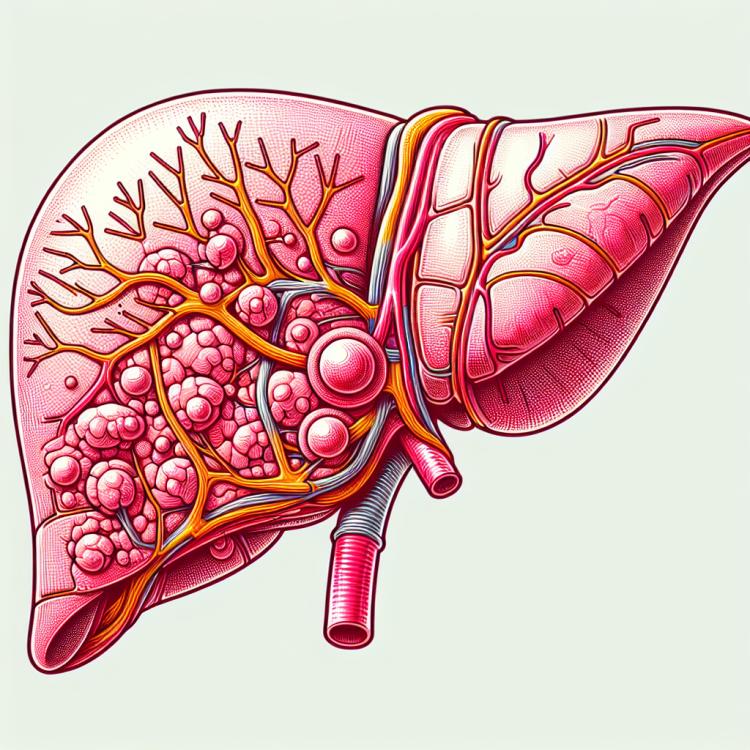
Liver cancer: causes, symptoms, and treatment methods
Definition of Liver Cancer
Liver cancer, or hepatocellular carcinoma, is a malignant tumor that typically begins in the liver cells. This type of cancer usually develops as a result of liver damage caused by the hepatitis B virus or hepatitis C, alcohol abuse, obesity, or other factors.
Liver cancer often remains unnoticed for a long time, as symptoms appear in the later stages. Severe fatigue, weight loss, abdominal pain, or an increase in abdominal size may be signs of liver cancer. The diagnosis of liver cancer includes various examination methods, such as ultrasound, computed tomography, and biopsy, to accurately identify the tumor and its characteristics.
Etiology of Liver Cancer
Liver cancer has a multifactorial etiology, where various aspects play a role in its development. The main causes of liver cancer are viral hepatitis, particularly hepatitis B and C, as well as cirrhosis of the liver caused by alcohol abuse or other factors. Other risk factors include the presence of fatty liver disease, metabolic disorders, genetic predispositions, and certain chemicals such as aflatoxins.
- Viral hepatitis: hepatitis B and hepatitis C can lead to chronic liver inflammation, increasing the risk of liver cancer.
- Cirrhosis: cirrhosis, especially caused by alcohol abuse or viral infections, significantly raises the likelihood of liver cancer.
- Fatty liver dystrophy: accumulation of fat in the liver (fatty liver disease) can be a risk factor for developing liver cancer.
- Metabolic disorders: diabetes and obesity are conditions that can contribute to the development of liver cancer.
- Genetic predispositions: the presence of certain genetic mutations and hereditary conditions may increase the risk of liver cancer.
Clinical picture of liver cancer
The clinical picture of liver cancer can vary depending on the stage of the disease, the nature of the tumor, and the presence of complications. The main symptoms of liver cancer may include abdominal pain or pain in the right shoulder, enlargement of the liver, jaundice, weight loss, ascites (accumulation of fluid in the abdominal cavity), and general weakness. Other manifestations include digestive disorders, the appearance of vascular “stars” on the skin, itching, as well as possible symptoms related to metastases in other organs.
- Abdominal pain or right shoulder pain: often occurs due to pressure from the tumor on surrounding tissues.
- Liver enlargement: caused by tumor growth and can be felt upon palpation.
- Jaundice: occurs due to impaired bile drainage caused by compression of the bile ducts by the tumor.
- Weight loss: often observed due to a general disturbance in the body’s metabolism.
- Ascites: accumulation of fluid in the abdominal cavity occurs due to impaired lymph circulation in the body.
Professional opinion on liver cancer treatment
Experts in oncology adhere to a comprehensive approach to treating liver cancer, which may include surgical intervention, radiation and chemotherapy, as well as targeted therapies and immunotherapy depending on the stage of the disease and the overall condition of the patient. The primary goal of liver cancer treatment is not only to eliminate the tumor but also to prevent recurrences, improve quality of life, and extend patient survival. Experts recommend an individualized approach for each patient, taking into account their overall condition, potential complications, and preferences to achieve the best treatment results.

Methods of diagnosing liver cancer
Diagnosis of liver cancer may include various examination methods for the accurate determination of the presence of a tumor and its characteristics. Clinical examination, biochemical blood tests, ultrasound of the abdominal organs, computed tomography, magnetic resonance imaging, and liver biopsy are often used for diagnosis. In addition, angiography, PET-CT scanning, and other specialized methods may be employed to confirm the diagnosis and determine the extent of cancer spread in the liver.
- Clinical examination: the doctor conducts a patient examination and performs abdominal palpation to identify an enlarged liver or other changes.
- Biochemical blood tests: determining the level of certain markers can assist in diagnosing liver cancer.
- Abdominal ultrasound: ultrasound examination allows for the detection of tumors and changes in the liver.
- Computed tomography (CT): this method provides a more detailed image of the liver and can help determine the size and shape of the tumor.
- Magnetic resonance imaging (MRI): MRI is also used for visualizing the liver and tumors within it with high detail.
Liver Cancer Therapy
- Surgical treatment: Includes liver resection, liver transplantation, and other surgical methods for removing cancerous tumors.
- Chemotherapy: Used to destroy cancer cells with drugs that can be administered in the form of pills or intravenous injections.
- Radiation therapy: Used to treat liver cancer with radiation directed at the cancerous tumor.
- Immunotherapy: Aims to stimulate the immune system for a more effective fight against cancer cells.
- Targeted therapy: Involves the use of drugs that block specific molecular targets on cancer cells, facilitating their destruction.
Measures for the prevention of liver cancer
- Avoid alcohol consumption: Long-term and excessive alcohol consumption can increase the risk of liver cancer.
- Maintain a healthy weight: Being overweight or obese can increase the likelihood of developing liver cancer, so maintain a healthy weight through proper nutrition and moderate physical activity.
- Get vaccinated against hepatitis B: Vaccination reduces the risk of contracting the hepatitis B virus, which is one of the main causes of liver cancer.
- Follow hygiene rules: Avoid contact with the blood of others, use gloves when handling sharp objects and needles to prevent possible infection with viruses that increase the risk of liver cancer.
- Get regular check-ups: Visit a doctor for regular check-ups and screenings for early detection of possible changes in the liver and timely initiation of treatment, which will help prevent the development of liver cancer.